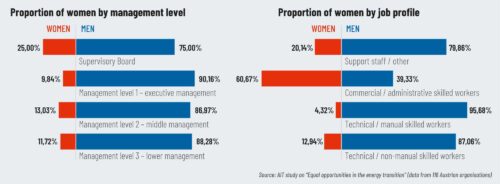The energy transition and Austria’s national objective of achieving “Climate neutrality by 2040” pose major challenges for our economy and society. The transition to a low-carbon economy and energy system that is fit for the future and based on renewable energy sources can only succeed if all available potential is exploited and lots of talented individuals take part. Women play a key role in this transformation process. Equal opportunities are needed in research and technology development, business and organisations, and in all key decision-making areas if we are going to be able to utilise the expertise and commitment of women in shaping a sustainable future of energy.
Diversity as a driver of innovation
Many studies1 have shown that equal opportunities contribute to greater openness and diversification in companies and organisations and promote the development of innovative strategies and solutions. Teams with a balanced proportion of women are often more solution-oriented, creative and efficient. Diversity has been shown to increase company performance and productivity, encourages sustainable and innovation-friendly structures and contributes towards greater employee well-being and engagement. There is an urgent need therefore to step up efforts to motivate women to gain qualifications in science, technology, engineering and mathematics and to provide targeted support to their career opportunities in the energy industry. A study commissioned by the European Commission’s Climate, Infrastructure and Environment Executive Agency (CINEA) is currently analysing the role of women in energy research in order to identify the factors for success for effective interventions in 35 countries.2 The current threat of a shortage of skilled personnel could also act as a driver for more equal opportunities, as many new positions, such as those in the fields of renewable energy sources, hydrogen or storage technologies, can only be filled if more women are recruited for these professions.
Women in the Austrian energy sector
Auch It is also evident in Austria that the energy sector requires targeted measures to promote greater diversity. Only 24% of employees in this sector are women according to a study on equal opportunities in the Austrian energy sector that was commissioned by the Climate and Energy Fund and conducted by the AIT (Austrian Institute of Technology).3Annual reports and sustainability reports as well as information on issues such as the advancement of women, gender mainstreaming and diversity were used for these analyses. Overall, data from 116 organisations of different sizes from all nine Austrian federal states were analysed. A significant correlation could be seen with the size of the company, as the larger the company, the lower the proportion of female employees. The proportion of women generally varies widely depending on the area of activity, with only 10% of executive management positions on average held by women. The proportion of women is highest in the commercial/administrative sector at 61%, and lowest among technical/manual specialists at 4%.

Effective measures
can be used to improve gender equality in companies. Gender-sensitive language, a work-life balance and actual implementation of equal opportunities in everyday life are becoming increasingly important in the minds of employees. The specific recommendations stated in the study include the targeted promotion of young talent and teacher training, the creation of role models, transparent and fair application processes and the development of new working models (part-time working and job sharing, working from home models, flexible working arrangements, parental leave and leaves of absence, paternity leave, etc.).
In this edition, we introduce some experts from the fields of research and business who show great commitment working in key positions in the energy sector and are making an important contribution towards the transformation of the energy system. Selected current projects, which are being implemented with the support of the Federal Ministry of Climate Action and the Climate and Energy Fund, provide an insight into the work of these role models.

„A just transition is imperative to achieve a sustainable future for all, whilst addressing the climate change emergency. Promoting equality and diversity across all aspects of the transition is also essential for the co-development of solutions towards a greener future. A multifaceted and whole system approach is key to our organisation, the Industrial Decarbonisation Research and Innovation Centre (IDRIC), as it is only through responsible innovation that we will address the complex challenges of a just transition. In this way, we are embedding and promoting equality, diversity and
inclusion in our industrial clusters and research institutions to bring societal and economic prosperity..“
Prof. Mercedes Maroto-Valer
IDRIC Director and Industrial Decarbonisation Champion,
UK Industrial Decarbonisation Research & Innovation Centre (IDRIC)
Winner of the Net-Zero Industries Mission Award 2023 in the category “Female Innovators”
1„Diversity is good for Growth“ study, PWC 2019
www.pwc.de/de/real-estate/pwc-diversity-is-good-for-growth.pdf
2Study on Gender Balance in the R&I Field to Improve the Role of Women in the Energy Transition
empirica.com/news/study-on-gender-balance-in-the-ri-field-to-improve-the-role-of-women-in-the-energy-transition
3nachhaltigwirtschaften.at/de/news/2023/20230724-studie-chancengleichheit-energiewende.php

